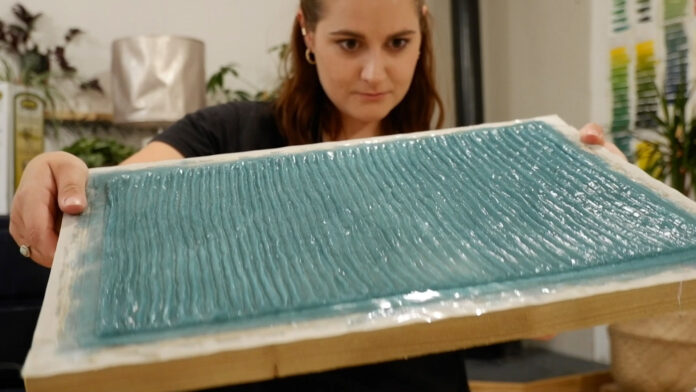Huddersfield, UK
An enterprising Huddersfield student is making innovative use of seaweed to make sustainability integral to her first steps in the world of textiles and fashion brand marketing.
Anna Watkins has built upon the experience gained from an Enterprise Placement Year (EPY) at the University to be given a £5,000 grant as one of just 64 people to have won a Young Innovator award from the Knowledge Transfer Network (KTN).
Starting from her kitchen before moving to her parents’ house during lockdown, Anna has used pots, pans and ingenuity to combine a variety of sustainable materials that go to make seaweed leather.
Her enterprise, Uncommon Alchemy, now produces beautifully handcrafted notebooks, wallets, tech cases and lampshades made from this unique substance. Now in the final year of her Fashion Brand Marketing degree, Cumbria-based Anna now plans to investigate how to scale up her production capacity.
Anna will be helped by the £5,000 award from the Young Innovators awards, run by Innovate UK in partnership with the KTN and the Prince’s Trust. She also took advantage of the University of Huddersfield’s EPY programme, which was the first of its kind in the UK when it was established in 2004 and which gives students the chance to research and explore the options of starting a business or self-employment.
Concerned by the lack of sustainability in the traditional methods of making fashion items, Anna researched how seaweed could be used in combination with other environmentally-friendly materials to produce a malleable plastic that can be turned to many different uses.
“It’s a really interesting material in the way it behaves and transforms over time. I found some open source recipes online, then I became a bit of a mad scientist,” says Anna. “In a week I made 100 samples – my flat was covered in jellies and slimes that were drying in moulds! I fell in love with biomaterials and it brought all the skills I had been building on together. It was much more in line with what I wanted to do.
Anna had initially pursued fashion garments for her Enterprise Placement Year, but discussions with the Enterprise Team who run the programme at the University took in her in a new direction.
“They encouraged me to go back to the heart of what I wanted to do,” adds Anna. “That brought me to biomaterials, because the lack of sustainability and options was frustrating. Fashion materials themselves are often unsustainable.
“Enterprise Placement Year was one of the main reasons why I wanted to come to Huddersfield, and I had always wanted to work for myself. The Enterprise Team were incredibly supportive.”
Heating dried, powdered seaweed usually used as a gelling agent in food production produces a jelly-like substance that becomes firm within two minutes. This can be poured into moulds, allowing Anna to create a range of useful products.
“I tried to grow mushroom mycelium in Tupperware under my bed, that didn’t quite work out! I tried a few low-tech things, mixing composite materials like adding industrial textile wool waste into the materials to get a mouldable product. Seaweed was relatively easy, without needing a lab.
The UK’s coronavirus lockdown saw Anna move back in to her parents’ house – “They were very understanding!” – which has become home to Anna’s experiments with silicon moulds and drying techniques for now.
The University’s Enterprise Team continue to work with Anna, having helped to unlock her passion when she seemed to be struggling for inspiration, while an enterprise grant funded by Santander Universities also provided Anna with support.
“We worked on an opportunity map with Anna to change her ideas to something she was more passionate about,” says Philip Clegg, Head of Entrepreneurship and Enterprise. “The EPY gave her the chance to see that she could successfully change direction, in this case looking at innovative materials. The Young Innovators award is a wonderful endorsement of Anna’s hard work and ingenuity.”
Next for Anna is investigating how to take her small-scale production to a new level.
“I’m looking at bio-derived, compostable polymers in a way that’s scalable to an industrial way of production, less me in my kitchen making small samples in a mad way!
“Seaweed is a fascinating material, but I am keeping my options open about where to go next with the raw materials that the plastic comes from. I am so excited by material innovation, it can go in so many directions from here.”

Subscribe To Our Newsletter
Join our mailing list to receive the latest news and updates from our team.









